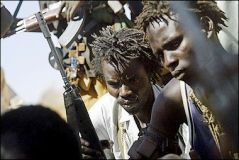AU struggles to save Darfur talks amid reports of fighting
ABUJA, Dec 19 (AFP) — African Union mediators battled to breathe life into Darfur’s peace talks after the Sudanese government belatedly agreed to call off an offensive against rebel positions in the western region.

|
|
Rebels from the Sudan Liberation Movement wait in their base in Gellab, North Darfur, Sudan, during a meeting with African Union officers.(AFP) |
But shortly after Sudan announced its decision to pull back, an African Union spokesman said that the latest reports from the field indicated that fighting was continuing and that someone had shot at an AU helicopter.
“One of our helicopters has been shot. They are firing on our helicopters. This shows that the ceasefire is not being observed. They did not comply. They have not stopped fighting,” AU spokesman Assane Ba told reporters in Abuja.
The spokesman said the report was based on initial information from the AU observer force in Darfur and that he could not say which side fired on the craft or if anyone was wounded.
On Saturday, Khartoum had dealt the Abuja peace process a near fatal blow, brushing aside international pressure on it to honour a ceasefire deal and instead launching attacks on the rebel-held southern Darfur town of Labado.
Then on Sunday, one day after the AU deadline for compliance with the truce, Sudanese Foreign Minister Mustafa Osman Ismail said government troops would henceforth respect the agreement signed by the parties in Ndjamena in April.
A joint Sudan-UN “mechanism has asked the government and the rebels to stop the fighting immediately, and the Sudanese government has agreed to comply with this demand as of today,” Ismail told reporters in Khartoum.
Sudan is ready to pull its forces back to the positions it held before the April deal, he said, as long as the rebels do likewise.
In Abuja, mediators concentrated on trying to get the talks back on track.
A diplomat, who asked not to be identified, said that senior Libyan official Ali Treki had been asked by AU chairman President Olusegun Obasanjo of Nigeria to meet with delegates from the warring parties in a bid to break the impasse.
The official AU spokesman, Ba, would not confirm the identity or nationality of the the envoy, but confirmed to reporters that an “African country” had been asked to help get the talks moving again by mediating between the parties.
The rebels — who since Tuesday have been refusing face-to-face contact with government envoys in protest at the latest offensive — said that a decision on whether on not to revive the political process rested with the AU.
“Our position as the two movements is that we have the will to reach the end of this round of talks,” said Mohammed Ahmed Tugod, chief negotiator of the armed opposition group the Justice and Equality Movement (JEM).
“It’s for the African Union to decide on the collapse of the talks. The Sudan government should take responsibility if this round of talks collapses,” he said at a joint news conference with the Sudan Liberation Movement (SLM).
On Saturday — while not sparing the rebels from criticism over attacks on aid workers and police stations — the African Union was very clear in its condemnation of the Khartoum government’s latest offensive.
As Saturday’s deadline came and went with no sign of the government backing down, the commander of the AU observer force in Darfur told international envoys in Abuja that government helicopters were bombarding Labado.
At the same time, from his headquarters in Addis Abeba, African Union Commission head Alpha Oumar Konare issued a statement calling on Khartoum “to immediately stop its present military offensive and withdraw its forces to their former positions”.
Khartoum is moving closer to a peace deal with rebels in the south, but remains under the threat of international sanctions over Darfur, where its proxy militias are accused of atrocities against civilians.
Darfur has been the embroiled in conflict since February last year, when the two rebel movements launched a revolt against Khartoum, claiming that the Arab-led government had marginalised and persecuted the region’s black African tribes.
In the subsequent crackdown, pro-government militias have attacked black communities, murdering and raping tens of thousands of civilians and driving more than 1.6 million from their homes, according to the United Nations.
